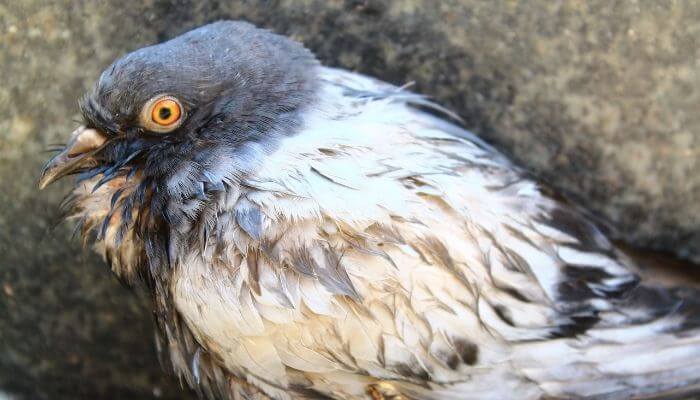As a pigeon breeder/owner you become very familiar with your pigeons and their behavior but would you know if one became sick?
Would you recognize the signs and know what action to take?

Some signs to look for include:
- Standing away from other pigeons
- Hunched posture
- No interest in flying or inability to fly
- Walking in circles or backward
- Fits
As an Amazon Associate we may earn a small commission on purchases made through any Amazon links, this helps support us, thankyou.
About to buy your first pigeon?
Click to view essential products to help you take the best care of them:
Owner’s Responsibilities
Whether you keep pigeons as pets or for breeding, making sure they are healthy is important.
That includes day-to-day care of your birds, but it also means being familiar with signs they might be sick and need medical care.
Knowing what to look for is one of the most responsible steps you can take as a pigeon owner.
Fortunately, it’s not too difficult and you should be able to tell pretty easily if your pigeons aren’t feeling well.
Use this guide to help you recognize a potential sickness and what you should do about it.
Symptoms Your Pigeon Might Be Sick
You spend enough time caring for your pigeons, so the chances that you won’t notice something is wrong are small.
However, it’s always a good idea to know what to be on the lookout for.
That way you can get your bird medical care as soon as possible if required.
Not only does this help protect the pigeon from complications, but it also helps prevent the spread of the illness to the other pigeons that you might have.
There are some signs to be aware of:
- Separating from the rest of the flock
- Hunching the body
- Depression
- Remaining on the ground, even when the rest of the flock flies
- Walking in circles
- Walking backward
- Having fits
- Throwing seeds into the air
- Unable to fly
- Walking on the wings
If you notice any of these signs and symptoms in your birds, it’s best to catch and isolate them immediately.
That way you have the pigeon examined, while also protecting the rest of the flock from getting sick.
Catching a Pigeon
If you suspect one of your pigeons is ill, you’ll need to catch it so you can examine it and seek medical care from a vet or pigeon-friendly rescue center if it’s necessary.
This can be tricky, but if your pigeon isn’t feeling well, it will likely be a bit easier to catch it.
You could attract the pigeon by offering it unsalted peanuts.
You can leave these on the ground near where the pigeon is resting.
When the bird gets close enough, toss a soft blanket or towel over it.
You can then pick the pigeon up and get it to a safe place to be examined.
Examining a Sick Pigeon
Being caught can be a bit traumatic for a bird, so it’s best to give your pigeon a chance to rest and calm down before you attempt to examine it.
In some cases, your pigeon may be acting sick, but could actually be injured. That’s why looking it over once it’s calmed down is so important.
You’ll know what you’re dealing with and can choose the appropriate plan of action to take care of the pigeon, whether it turns out that it’s sick or hurt.
Use the following steps to examine your pigeon.
- Check for bite wounds – if your pigeon has been near a dog, cat or other animals, it may have been bitten. These wounds will often be hidden by the feathers so make sure you look very closely over the entire pigeon’s body.
- Look for other injuries – this might be cuts, abrasions or broken bones. Sometimes when a bird is hurt, it will have symptoms that mimic an illness. You should also look for scabs or lesions anywhere on the pigeon’s body. That makes it vital to ensure that there aren’t any wounds that need to be taken care of.
- Look inside the beak and mouth – gently open your pigeon’s beak and examine the inside of its mouth and throat. If you see white or cheesy lumps, your pigeon may be suffering from canker or pigeon pox.
- Look for discharge from the eyes and nose – this is something that should be checked out by a veterinarian, especially if it’s accompanied by sneezing or breathing difficulties.
- Have a look at the pigeon’s droppings – while it’s not a fun job, your pigeon’s waste can give you some clues to its health. Droppings that are watery or green indicate coccidiosis. Green droppings with extreme weight loss indicate that a pigeon isn’t absorbing nutrients and may be starving.
- Check for swelling – usually swelling indicates a problem and should be checked out. Specifically, look for swelling at the joints, which could mean your pigeon is suffering from paratyphoid.
- Monitor behaviour changes – behaviour is one of the biggest clues that your pigeon may be ill. For example, neck torsion could indicate paramyxovirus.
It’s important to seek proper medical care for any of these signs and symptoms. Quick treatment makes for a better prognosis and ensures that your pigeon doesn’t suffer unnecessarily.
Also Read: 13 Signs a Pigeon is Dying
Caring for a Sick Pigeon
The good news is that it’s unlikely that you will get sick from handling a pigeon who is ill or injured.
However, there are some precautions you should take to ensure the health of the bird and your own health as well.
It’s always a good idea to wear gloves and wash your hands well with warm, soapy water after handling your birds.
This is especially important if you have other pigeons, as it will help reduce the risk of spreading the illness to the rest of the flock.
Here are some other precautions you need to take as you care for a sick bird:
- Isolate the sick pigeon – this reduces the risk of spreading the illness.
- Watch the temperature – make sure your bird isn’t too hot or too cold.
- Be cautious with food and water – you should never force a pigeon to eat or drink. This increases the risk of choking, which can lead to death. If your bird refuses all food and drink, contact a veterinarian for assistance.
- Don’t remove growths – if your pigeon has growths in its mouth, never try to remove them. This can lead to bleeding and may cause suffocation.
If you have a sick pigeon, you are naturally worried about its health. Proper care and knowing what to look for are the best steps you can take.

This article was written by our qualified veterinarian Cristina.
This is part of our commitment to providing you with the most trustworthy veterinary advice for your pigeons.
Sources:
